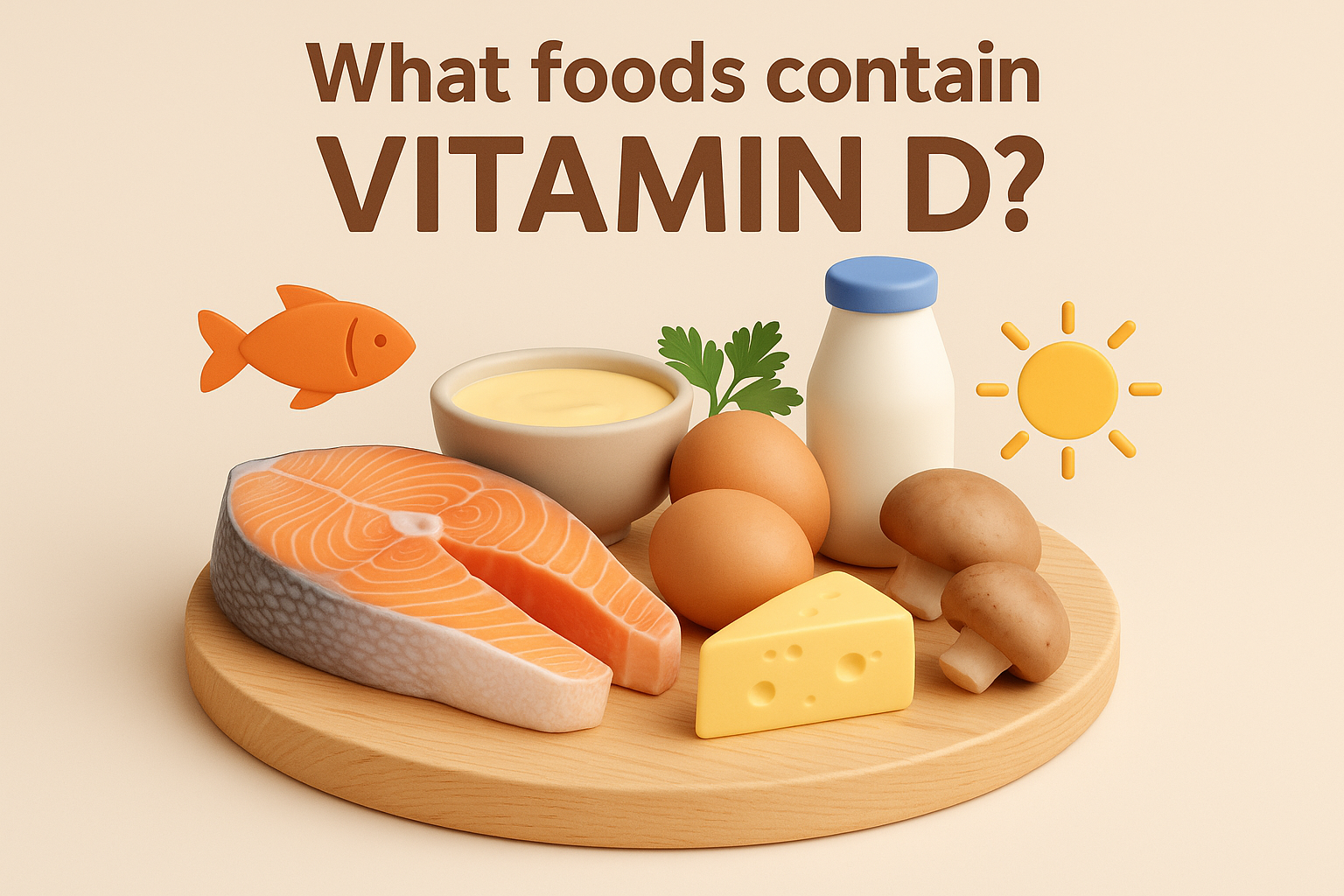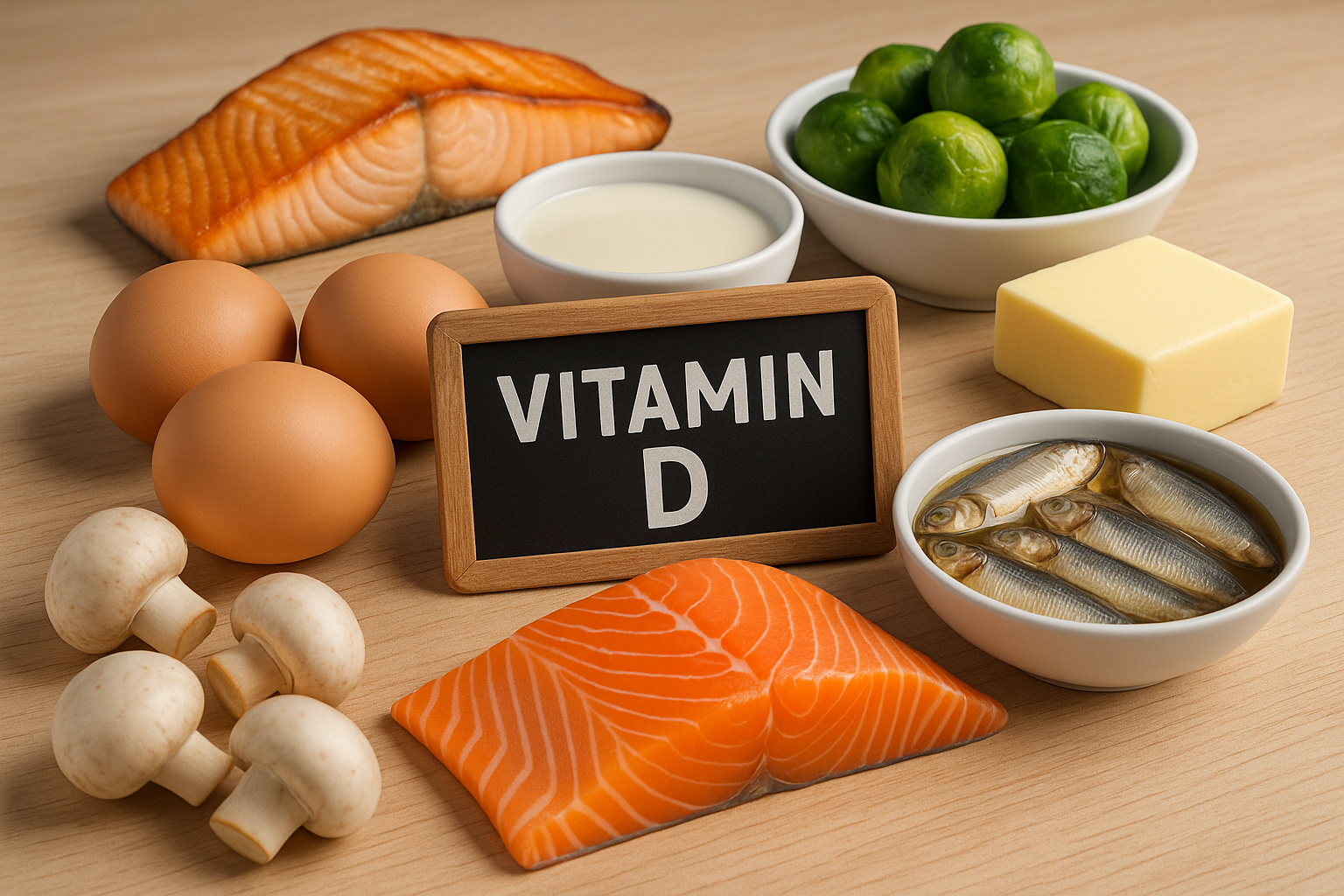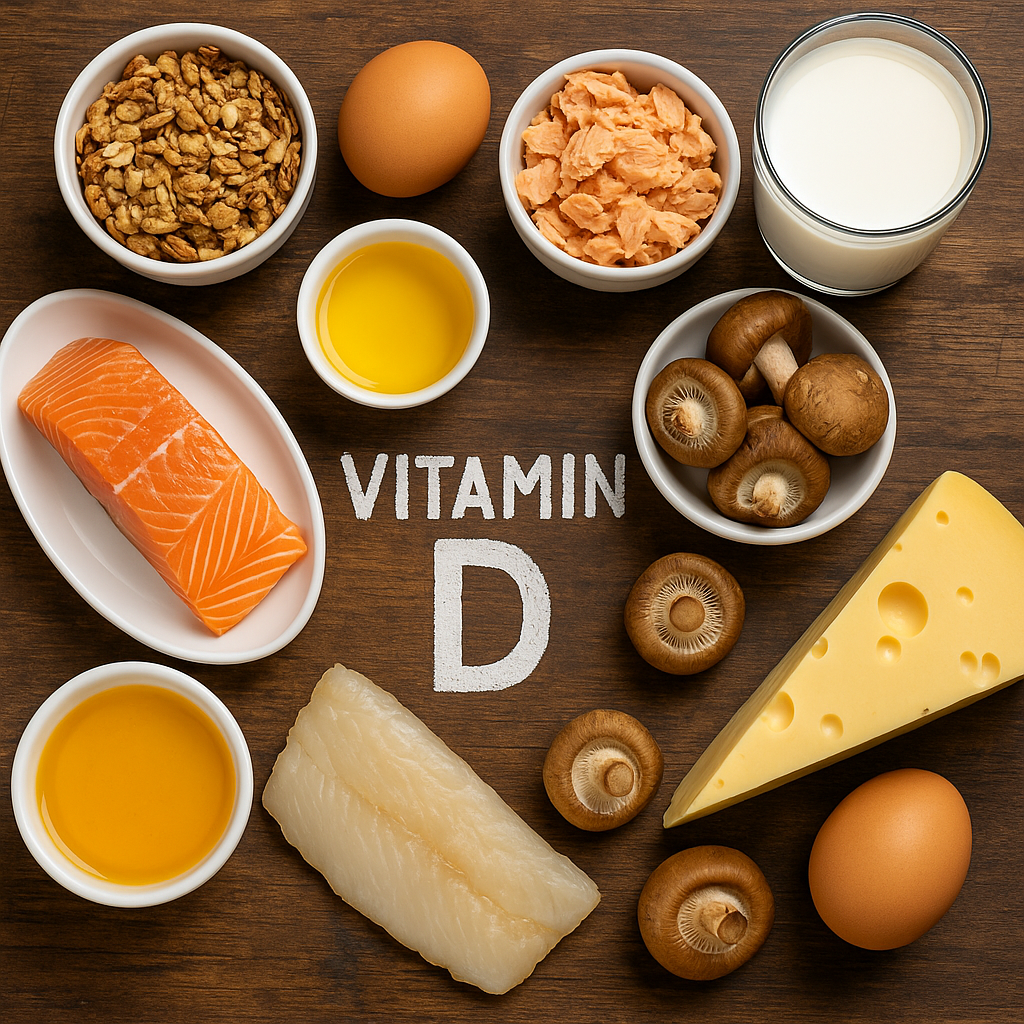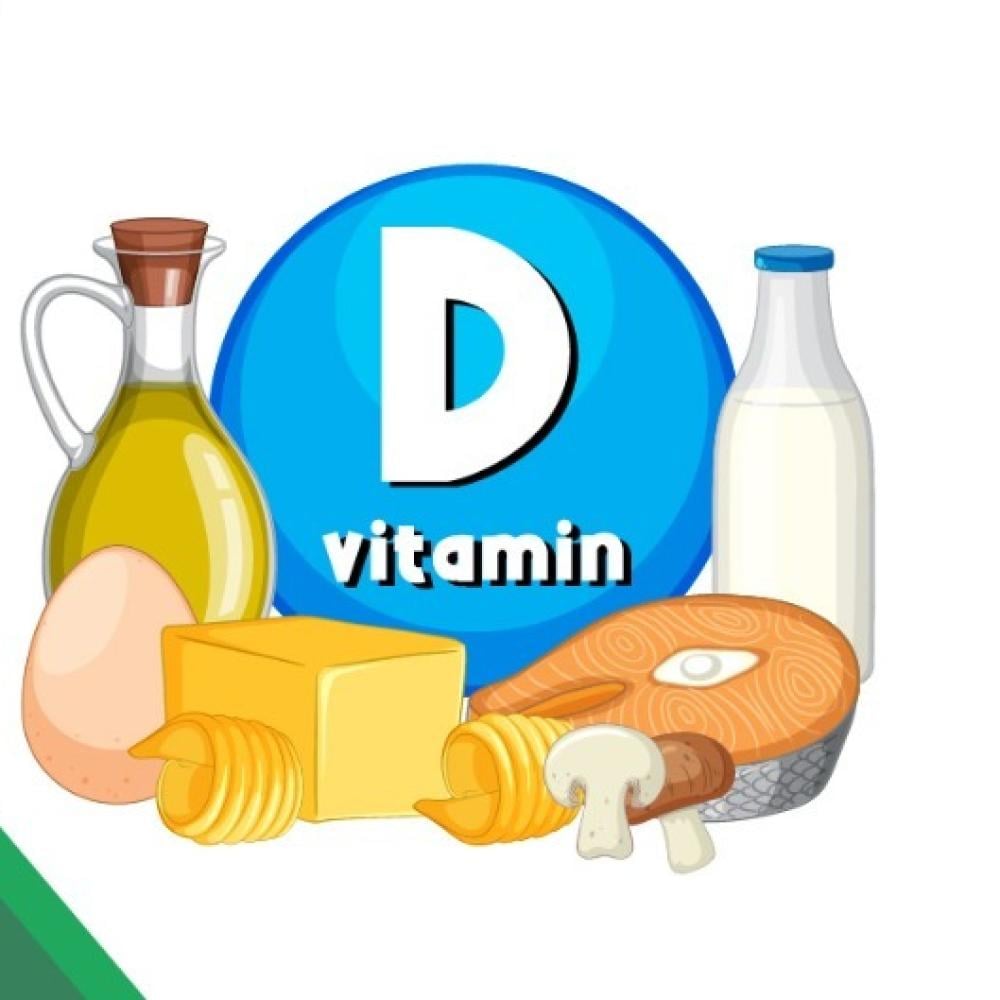Welcome to Your Ultimate Guide to Foods Rich in Vitamin D
Are you looking to enhance your health through diet? You've come to the right place! Our comprehensive guide, "Top 10 Foods Rich in Vitamin D: Your Guide to Sunlight in a Diet," will help you discover essential foods that can significantly boost your Vitamin D levels.
Beyond the Sunshine: Discover Foods Packed with Vitamin D
While sunlight is a natural source of Vitamin D, many foods can play a crucial role in meeting your daily nutritional requirements. From fish to fortified foods, we explore the best sources of Vitamin D, ensuring you get the nutrients your body needs.
Boost Your Health with Essential Foods High in Vitamin D
Incorporating Vitamin D-rich foods into your diet is vital for optimal health. Explore the ultimate list of Vitamin D-rich foods that not only taste great but also support your immune system and contribute to stronger bones and muscles.
Understanding Vitamin D: Which Foods Should You Be Eating?
Navigating the world of nutrition can be overwhelming. Our guide helps you understand which foods should be on your plate to prevent Vitamin D deficiency. Delightful and nutritious, these foods can help you meet your Vitamin D needs effortlessly.
From Eggs to Mushrooms: Unexpected Foods That Contain Vitamin D
Many people are surprised to learn that Vitamin D can be found in a variety of foods. From eggs to mushrooms, we highlight the unexpected sources that can help increase your Vitamin D intake without compromising on taste.
How to Get Your Daily Dose of Vitamin D Through Your Diet
Wondering how to obtain your daily Vitamin D? Our tips will guide you through incorporating these nutrient-rich foods into your meals, making healthy eating an enjoyable experience.
The Connection Between Diet and Vitamin D: Foods You Shouldn't Miss
Stay informed about the relationship between diet and Vitamin D levels. Our insights explore the most effective foods that ensure you're supporting your health and well-being.
Discover the Best Dietary Sources of Vitamin D for Optimal Health
Join us on a culinary journey as we reveal the best dietary sources of Vitamin D. From seafood delights to fortified cereals, you'll find delicious ways to enhance your diet and improve your health.
Start your journey towards better health today by exploring our top food sources rich in Vitamin D. You won't just be eating nutritiously; you'll be creating a lifestyle that supports your body's needs!

Introduction
Vitamin D, often referred to as the "sunshine vitamin," plays a vital role in maintaining overall health. From supporting bone strength to boosting immunity and improving mood, this essential nutrient cannot be overlooked. Unfortunately, many individuals worldwide suffer from Vitamin D deficiency due to limited sun exposure or poor dietary choices. This comprehensive article explores the most important foods rich in Vitamin D, how they benefit the body, and how to integrate them into your daily diet.
Top Five Foods Rich in Vitamin D and Their Health Benefits
1. Fatty Fish
Salmon, mackerel, tuna, and sardines are among the richest natural sources of Vitamin D. A single serving of cooked salmon can provide over 50% of the daily recommended intake. These fish also offer omega-3 fatty acids, which are essential for heart and brain health.
2. Egg Yolks
Egg yolks contain moderate amounts of Vitamin D. Including whole eggs in your diet helps increase your Vitamin D levels while also providing high-quality protein, choline, and healthy fats.
3. Fortified Dairy Products
Milk, cheese, and yogurt are often fortified with Vitamin D. Consuming these products regularly supports bone density and reduces the risk of osteoporosis.
4. Mushrooms
Mushrooms, especially those exposed to UV light, are the only plant-based source of Vitamin D2. While not as potent as D3 found in animal sources, they remain valuable for vegetarians and vegans.
5. Cod Liver Oil
Just one teaspoon of cod liver oil delivers more than 100% of the daily requirement of Vitamin D. It also provides vitamin A and omega-3s, making it a powerful immune booster.
Discover Foods Containing Vitamin D and Their Role in Enhancing Your Health
Vitamin D regulates calcium and phosphorus levels in the blood, ensuring healthy teeth and bones. It also reduces inflammation, supports immune response, and may help prevent chronic diseases such as type 2 diabetes and certain cancers.
What Are the Nutritional Sources of Vitamin D and How to Obtain It?
While sunlight remains the most natural way to obtain Vitamin D, not everyone can rely on it year-round. Foods, therefore, become essential. Along with the top five mentioned, other sources include beef liver, fortified cereals, and plant-based milks.
Seafood: The Richest Sources of Vitamin D and Their Health Benefits
Shellfish such as oysters and shrimp, along with fatty fish, provide an excellent mix of Vitamin D, B vitamins, and essential minerals. Regular consumption promotes cardiovascular health and brain function.
Eggs and Milk: How These Foods Contribute to Higher Vitamin D Levels
Consuming fortified milk and whole eggs can significantly boost your daily intake. Including these in breakfast provides a strong nutritional start to the day.
Plant-Based Foods: Do They Contain Vitamin D? Here’s What You Need to Know
While plant-based diets typically lack Vitamin D3, fortified products such as soy milk, almond milk, and breakfast cereals help fill the gap. Also, UV-exposed mushrooms are a great plant source.
Importance of Vitamin D: A List of Foods Packed with This Essential Nutrient
- Salmon
- Egg yolks
- Fortified milk and juices
- Mushrooms
- Cod liver oil
- Beef liver
- Fortified cereals
- Shrimp
- Sardines
How Does Vitamin D Deficiency Affect Your Health? And What Foods Can Compensate?
Symptoms of deficiency include fatigue, bone pain, muscle weakness, and depression. Long-term deficiency can lead to rickets in children and osteomalacia in adults. Consuming Vitamin D-rich foods can prevent these conditions and support overall health.
Immune-Boosting Foods: What Do You Know About Vitamin D and Its Sources?
Vitamin D enhances the pathogen-fighting effects of monocytes and macrophages. Regular intake of Vitamin D-rich foods boosts your body’s ability to ward off infections.
Healthy Nutrition: How to Incorporate Vitamin D into Your Daily Diet
Start your day with fortified cereals and milk, add grilled salmon or tuna to your lunch, snack on boiled eggs, and include mushrooms in your dinner. Supplementation may also be necessary based on your levels.
The Best Vitamin D-Rich Foods: A Comprehensive Guide
Whether you’re omnivorous, vegetarian, or vegan, there are plenty of ways to get your daily dose of Vitamin D. Understanding the options available allows you to build a balanced and effective nutritional plan.
What Are the Dietary Sources of Vitamin D?
Besides the obvious animal-based sources, dietary sources now include various fortified foods available in most grocery stores. Always check nutrition labels to identify Vitamin D-fortified options.
Do You Know Which Foods Contain Vitamin D?
Many people are surprised to learn that their favorite foods—like certain cereals, orange juice, and even some breads—may be fortified with Vitamin D. Read packaging carefully and be aware of your options.
A List of the Most Vitamin D-Rich Foods
- Salmon
- Mackerel
- Cod liver oil
- Fortified milk
- Fortified cereals
- Egg yolks
- Mushrooms
- Beef liver
- Sardines
- Shrimp
How Do Vitamin D-Rich Foods Affect Our Health?
From maintaining strong bones and teeth to regulating mood and preventing disease, the health impact of Vitamin D cannot be overstated. Eating a balanced diet rich in this vitamin leads to long-term well-being.
Foods High in Vitamin D: The Ideal Solution to Boost Your Health
Incorporating these foods into your meals is an easy and effective way to safeguard against deficiency. This is especially crucial for people living in regions with limited sunlight.
Vitamin D and Diet: What Should You Eat to Raise Its Levels?
Combine sun exposure with a diet high in Vitamin D-rich foods. This holistic approach ensures your body maintains adequate levels year-round.
Learn About the Best Dietary Sources of Vitamin D
Consulting a nutritionist can help tailor a diet to your specific needs, but starting with the foods listed here is a great first step toward better health.
Health Benefits of Vitamin D: What Are the Foods That Offer It?
Alongside supplements, your diet plays a critical role in maintaining healthy Vitamin D levels. Add a variety of sources to keep your meals interesting and nutritious.
How Can Food Sources Help Meet Your Vitamin D Requirements?
With thoughtful meal planning, it's entirely possible to meet daily Vitamin D needs without supplementation. Rely on food first, and use supplements only if necessary based on blood tests.

Beyond the Sunshine: Discover Foods Packed with Vitamin D
Understanding the Importance of Vitamin D
Vitamin D is often hailed as a super nutrient due to its wide array of health benefits. It plays a crucial role in maintaining strong bones by enhancing calcium absorption. Additionally, it supports the immune system, has anti-inflammatory properties, and even aids in regulating mood. Interestingly, most people don’t realize just how essential this vitamin is in their daily lives.Research links vitamin D deficiency with various health issues, including osteoporosis, autoimmune diseases, and a weakened immune system. Therefore, incorporating vitamin D-rich foods into one’s diet is vital for overall well-being.
Why Sunlight Alone May Not Be Sufficient
While sunlight is a natural source of vitamin D and can indeed help boost levels in the skin, relying solely on it can be problematic. Various factors can diminish sunlight's effectiveness:
- Geographical location: People living in northern climates may not receive enough sun exposure during the winter months.
- Skin type: Darker skin tones produce less vitamin D compared to lighter skin.
- Lifestyle: Those who spend most of their time indoors or use sunblock may miss out on this essential nutrient.
Because of these barriers, supplementing with dietary sources of vitamin D is a practical solution for achieving optimal health.
Boost Your Health: Essential Foods That Are High in Vitamin D
The Role of Vitamin D in the Body
Having a proper understanding of vitamin D's role in the body can inspire one to include more vitamin D-rich foods in their diet. This powerhouse nutrient supports various bodily functions, such as:
- Bone Health: It enhances calcium absorption, crucial for maintaining strong bones and preventing fractures.
- Immune Function: Vitamin D helps regulate immune responses, making the body more resilient against infections.
- Muscle Strength: It contributes to muscle function, which is vital for overall physical strength and mobility.
Many people I know have experienced noticeable improvements in their energy levels and overall wellness after actively working to increase their vitamin D intake.
Benefits of Consuming Vitamin D-Rich Foods
Incorporating vitamin D-rich foods into your meals offers a treasure trove of benefits:
- Improved Mood: Several studies link vitamin D levels with mood regulation, which can help combat seasonal depression.
- Stronger Immunity: A well-regulated immune response means fewer sick days and a healthier lifestyle overall.
- Better Bone Density: Regular consumption can help in the prevention of osteoporosis and other bone-related disorders.
In essence, consuming foods high in vitamin D can transform not just health but also overall quality of life!
Exploring the Best Sources of Vitamin D: From Fish to Fortified Foods
Fish: A Key Source of Vitamin D
When it comes to natural sources of vitamin D, fish tops the list. Fatty fish, in particular, are packed with this essential nutrient. Varieties like salmon, mackerel, and sardines are not only delicious but also incredibly nutritious. For instance, just a 3.5-ounce serving of salmon can provide about 570 IU of vitamin D! That’s a substantial portion of the recommended daily intake. Personally, I love whipping up a quick grilled salmon dish—it’s simple, tasty, and feels good knowing I’m nourishing my body.
Fortified Foods: How They Contribute to Vitamin D Intake
While fish is an excellent natural option, many people also rely on fortified foods to boost their vitamin D intake. These are everyday foods that have had vitamin D added during processing, making it easier to meet dietary needs. Common fortified items include:
- Dairy Products: Milk and yogurt often have vitamin D added.
- Cereals: Breakfast cereals are frequently reinforced with vitamin D.
- Plant-Based Milks: Almond, soy, and oat milks typically come fortified.
Incorporating these fortified foods into one’s diet can significantly help in achieving optimal vitamin D levels, especially for those who may not consume fish or dairy regularly. It’s about finding the right balance!
Delicious and Nutritious: Foods to Help You Meet Your Vitamin D Needs
Incorporating Vitamin D-Rich Foods Into Your Diet
Now that you know which foods are high in vitamin D, it’s time to explore how to incorporate them into your daily meals. Making small adjustments can easily boost your intake without much hassle! Here are a few practical tips:
- Start Your Day Right: Choose fortified cereals or oatmeal topped with a splash of almond or soy milk for breakfast.
- Go Fish: Try to include fatty fish in your meals a couple of times a week. A simple grilled salmon with a side of veggies is an excellent choice!
- Snack Wisely: Opt for yogurt or mixed nuts as satisfying snacks that can help you meet your vitamin D goals.
Tasty Recipes Featuring Vitamin D-Loaded Ingredients
Cooking with vitamin D-rich ingredients can be fun and flavorful! Here are a couple of recipe ideas to get you started:
- Creamy Mushroom Risotto: Use vitamin D-rich mushrooms and serve with some grated Parmesan, which is often fortified.
- Savory Breakfast Tacos: Fill whole grain tortillas with scrambled eggs and avocado, sprinkling them with smoked salmon for an added vitamin D boost.
These meals not only taste great but also ensure you’re meeting your vitamin D needs deliciously!
How to Get Your Daily Dose of Vitamin D Through Your Diet
Recommended Daily Intake of Vitamin D
Understanding how much vitamin D you need daily is a crucial step towards optimal health. The recommended daily intake varies by age, lifestyle, and individual needs. Generally, the guidelines suggest:
- Children (1-18 years): 600 IU (15 mcg)
- Adults (19-70 years): 600 IU (15 mcg)
- Older adults (70+ years): 800 IU (20 mcg)
As someone who tends to overlook dietary guidelines, I’ve found that keeping track of my intake helps ensure I get what I need, especially during the winter months when sunlight exposure is low.
Tips for Increasing Vitamin D Absorption
Getting enough vitamin D is not just about food intake; how your body absorbs it matters too. Here are some tips to enhance absorption:
- Pair with Fats: Consuming vitamin D-rich foods with healthy fats (like olive oil or avocado) can boost absorption.
- Magnesium Matters: Ensure you’re getting enough magnesium from sources like nuts and leafy greens, as it aids in vitamin D metabolism.
- Limit Excess Alcohol: High alcohol consumption can hinder absorption, so moderation is key.
By applying these tips and aiming for the recommended daily intake, you’ll be well on your way to maintaining healthy vitamin D levels!
Vitamin D Deficiency? Here Are the Foods You Need to Know About!
Identifying Symptoms of Vitamin D Deficiency
Recognizing the signs of vitamin D deficiency is an important first step in taking charge of your health. Some common symptoms include:
- Fatigue: Feeling unusually tired can indicate low vitamin D levels.
- Bone Pain: Vitamin D is essential for calcium absorption, so deficiencies can lead to discomfort.
- Mood Changes: Unexplained feelings of sadness or depression may be linked to low vitamin D.
I remember feeling inexplicably tired for weeks until I learned that my vitamin D levels were low, prompting me to adjust my diet.
Foods That Can Help Combat Vitamin D Deficiency
If you suspect you’re lacking in vitamin D, consider including these foods in your diet:
- Fatty Fish: Salmon, mackerel, and sardines are potent sources.
- Fortified Foods: Look for fortified products like milk, cereal, or orange juice.
- Egg Yolks: A simple addition to various dishes that can help boost your intake.
By incorporating these vitamin D-rich foods, you might find it easier to overcome deficiency and reclaim your energy and well-being!
Top Food Sources Rich in Vitamin D: What You Need to Know
Ranking of Foods Highest in Vitamin D Content
When it comes to boosting your vitamin D levels, knowing which foods pack the most punch is crucial. Here’s a quick ranking of some of the top sources:
- Fatty Fish: Salmon (about 570 IU per 3.5 oz), mackerel, and sardines are your best bets.
- Cod Liver Oil: A tablespoon provides a whopping 1,360 IU!
- Fortified Foods: Certain brands of milk, orange juice, and cereals can provide between 100 to 200 IU.
- Mushrooms: Some varieties, like shiitake and maitake, can provide up to 1,000 IU when exposed to sunlight.
- Egg Yolks: Each yolk contains about 40 IU.
I try to have a combination of these in my meals throughout the week, making it delicious and straightforward to maintain my intake!
Factors to Consider When Selecting Vitamin D Sources
When choosing your vitamin D sources, consider:
- Bioavailability: Some sources are more easily absorbed by the body. Fatty fish tend to be a great option for this!
- Dietary Restrictions: For vegetarians or vegans, fortified foods and mushrooms are key options.
- Quality and Processing: Opt for whole, natural food products when possible for the best nutrient density.
By being mindful of these factors, you can effectively enhance your vitamin D intake and overall well-being!
The Ultimate Guide to Foods That Boost Your Vitamin D Levels
Strategies for Maximizing Vitamin D Absorption
To truly benefit from your vitamin D-rich foods, it's essential to optimize absorption. Here are a few strategies that I’ve personally found helpful:
- Pair with Healthy Fats: Vitamin D is fat-soluble, so consuming it with healthy fats—like avocado, nuts, or olive oil—can enhance its absorption significantly.
- Optimize Gut Health: A healthy gut can aid in nutrient absorption. Incorporate probiotics from yogurt, kefir, or fermented foods into your diet for better overall digestive health.
- Avoid Certain Foods: Too much fiber and calcium at the same time might hinder vitamin D absorption, so try to balance your meals effectively.
Balancing Vitamin D Intake with Other Nutrients
Vitamin D doesn't act alone; it works best when balanced with other nutrients:
- Calcium: These two nutrients work in synergy for bone health. Ensuring adequate calcium intake from dairy or leafy greens is vital.
- Magnesium: This mineral helps convert vitamin D into its active form. Nuts and whole grains are excellent sources.
- Vitamin K: This nutrient complements vitamin D in maintaining bone density. Find it in foods like kale, spinach, and eggs.
By integrating these strategies, you can maximize your vitamin D benefits while enjoying a well-rounded, nutritious diet!
Vitamin D-Rich Foods: A Delicious Way to Support Your Immune System
The Relationship Between Vitamin D and Immunity
Vitamin D plays a crucial role in supporting the immune system, acting as a powerful modulator of immune responses. When levels of vitamin D are sufficient, the body can better fend off infections and reduce the risk of chronic diseases. Recent studies indicate that adequate vitamin D levels can decrease the incidence of respiratory infections and enhance the antimicrobial response. Personally, I notice I feel much stronger and more resilient during the colder months when I make an effort to include vitamin D-rich foods in my diet.
Recipes That Promote Immune Health
Here are a couple of delicious recipes that not only are rich in vitamin D but also support immune health:
- Garlic Lemon Salmon: Grill salmon fillets with garlic, lemon, and a touch of rosemary for a tasty way to get your vitamin D.
- Creamy Spinach and Mushroom Risotto: This dish combines vitamin D-rich mushrooms and fortified broth, bringing comfort food to a nutritious level.
By adding these recipes to your meal rotation, you can enjoy delicious foods that actively support your immune system, keeping you feeling great year-round!
Eating for Health: Top Foods High in Vitamin D
Incorporating Vitamin D Into a Balanced Diet
Incorporating vitamin D into a balanced diet doesn’t have to be complicated! It’s about making simple adjustments that can lead to significant health benefits. Here are some easy ways to add more vitamin D-rich foods to your meals:
- Breakfast Boost: Begin your day with a bowl of fortified cereal topped with yogurt or milk.
- Lunch Delight: Make a salad with canned tuna or salmon for a tasty and nutritious midday meal.
- Snack Smart: Grab a handful of almonds or sunflower seeds, both of which contribute to healthy fat intake, enhancing vitamin D absorption.
As someone who has made this a daily practice, I've found it incredibly satisfying to know I'm fueling my body right.
Nutritional Benefits of Vitamin D-Rich Foods
Vitamin D-rich foods offer several nutritional advantages beyond bone health:
- Enhanced Mood: These foods can help stabilize mood and combat feelings of depression.
- Improved Immune Function: A strong immune system means fewer sick days.
- Potential Cardiovascular Benefits: Some studies suggest adequate vitamin D may lower the risk of heart disease.
By focusing on vitamin D-rich foods, you're not only enhancing your nutrient intake but also contributing to your overall health and well-being!
Vitamin D in Your Diet: What to Eat for Strong Bones and Muscles
How Vitamin D Supports Bone Health
Vitamin D is a key player in maintaining strong bones, and its role cannot be overstated. It enhances calcium absorption in the body, which is essential for building and remodeling bones. Without adequate vitamin D, bones can become thin and brittle, increasing the risk of fractures. I remember my friend who started focusing on vitamin D intake after suffering a stress fracture. With a combination of supplements and dietary changes, including more vitamin D-rich foods like salmon and fortified dairy, she's felt a significant improvement in her bone health!
Muscle-Strengthening Foods for Optimal Health
In addition to supporting bone health, vitamin D plays a vital role in muscle function. Here are some muscle-strengthening foods to include in your diet:
- Eggs: Packed with vitamins and protein, they're a versatile addition to any meal.
- Lean Meats: Chicken and turkey not only contain protein but are also great sources of other essential nutrients.
- Legumes: Beans and lentils are rich in protein and fiber, making them excellent for muscle recovery.
By combining these foods with adequate vitamin D, you can effectively strengthen your bones and muscles, paving the way for a healthier, more active life!
. The Connection Between Diet and Vitamin D: Foods You Shouldn’t Miss
Integrating Vitamin D Into Various Diet Plans
Understanding how to integrate vitamin D into different diet plans is essential, especially for those following specific dietary restrictions. Here are some tips that have worked for me and others looking to boost their vitamin D intake:
- Vegetarians: Look for fortified plant-based milks, like almond or soy, and include mushrooms exposed to sunlight.
- Vegans: Turn to fortified foods like orange juice and nutritional yeast, which can provide additional nutrients while catering to a vegan lifestyle.
- Paleo or Keto: Fatty fish, like salmon, and eggs fit perfectly into these diets, offering both vitamin D and healthy fats.
By adjusting meals creatively, you can ensure you're not missing out on this vital nutrient, no matter your dietary choices.
Long-Term Health Implications of Vitamin D Consumption
Consistent consumption of vitamin D-rich foods can significantly impact your long-term health. Sufficient vitamin D not only lowers the risk of osteoporosis but can also improve mood and bolster immune function. I’ve witnessed firsthand how maintaining optimal vitamin D levels contributes to better overall well-being, making it easier to navigate life's ups and downs! Prioritizing this vital nutrient is an investment in your future health.

Vitamin D is an essential nutrient that plays a key role in bone health, immune function, and overall well-being. It is found in certain foods, which can be grouped into the following categories:
1. Fatty Fish
These are among the richest natural sources of vitamin D:
- Salmon (wild has more than farmed)
- Mackerel
- Sardines
- Tuna (fresh or canned)
- Herring
2. Fish Liver Oils
- Cod liver oil: One of the most concentrated natural sources of vitamin D.
3. Egg Yolks
- Eggs, especially from chickens that are pasture-raised or supplemented with vitamin D, provide small amounts of vitamin D.
4. Fortified Foods
Many foods are fortified with vitamin D to help meet dietary needs:
- Milk (cow, soy, almond, or oat milk often fortified)
- Breakfast cereals
- Orange juice (fortified varieties)
- Yogurt (fortified)
- Margarine or spreads (fortified)
5. Mushrooms
Certain mushrooms exposed to ultraviolet (UV) light during growth can provide vitamin D:
- Portobello mushrooms (UV-exposed)
- White mushrooms (UV-exposed)
6. Meat and Organ Meats
While not as rich as fish, some meats contain small amounts of vitamin D:
- Beef liver
- Pork chops
7. Supplements and Alternatives
For individuals who struggle to get enough vitamin D through diet alone, supplements can be an effective option.
Conclusion
Vitamin D is essential for more than just bone health—it affects your immune system, mood, and overall vitality. By prioritizing foods rich in this vital nutrient, you empower your body to thrive. Whether from fatty fish, fortified dairy, mushrooms, or eggs, the options are diverse and delicious. Make informed choices and let your diet be your first line of defense against deficiency.
Confectionery and biscuit products
Personal care and cleaning products
Personal care and cleaning products


